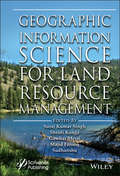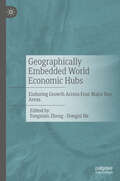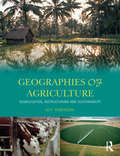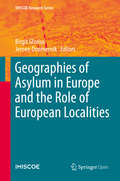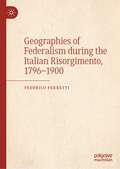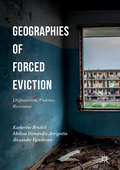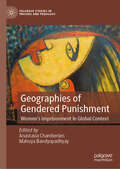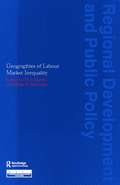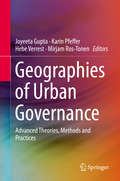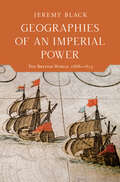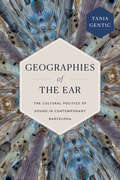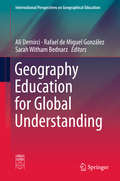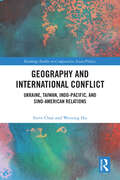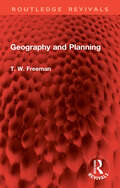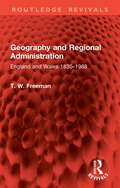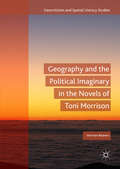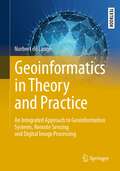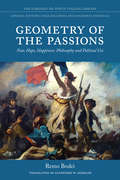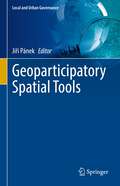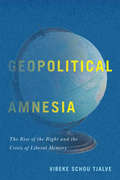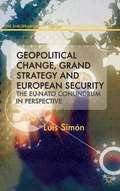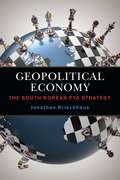- Table View
- List View
Geographic Information Science for Land Resource Management
by Shruti Kanga Suraj Kumar Singh Gowhar Meraj Majid Farooq SudhanshuGeographic Information Science for Land Resource Management is a comprehensive book focusing on managing land resources using innovative techniques of spatial information sciences and satellite remote sensing. The enormous stress on the land resources over the years due to anthropogenic activities for commercialization and livelihood needs has increased manifold. The only solution to this problem lies in the stakeholders' awareness, which can only be attained through scientific means. The awareness is the basis of the sustainable development concept, which involves optimal management of natural resources, subject to the availability of reliable, accurate, and timely information from the global to local scales. GIScience consists of satellite remote sensing (RS), Geographical Information System (GIS), and Global Positioning System (GPS) technology that is nowadays a backbone of environmental protection, natural resource management, and sustainable development and planning. Being a powerful and proficient tool for mapping, monitoring, modeling, and managing natural resources can help understand the earth's surface and its dynamics at different observational scales. Through the spatial understanding of land resources, policymakers can make prudent decisions to restore and conserve critically endangered resources, such as water bodies, lakes, rivers, air, forests, wildlife, biodiversity, etc. This innovative new volume contains chapters from eminent researchers and experts. The primary focus of this book is to replenish the gap in the available literature on the subject by bringing the concepts, theories, and experiences of the specialists and professionals in this field jointly. The editors have worked hard to get the best literature in this field in a book form to help the students, researchers, and policymakers develop a complete understanding of the land system's vulnerabilities and solutions.
Geographically Embedded World Economic Hubs: Enduring Growth Across Four Major Bay Areas
by Yongnian Zheng Dongni HeThis book develops the concept and theory of geographically embedded world economic hubs through a comparative analysis of developmental strengths of the four major bay areas in the world — the San Francisco Bay Area, the New York Bay Area, the Tokyo Bay Area, and the Guangdong-Hong Kong-Macao Greater Bay Area. The book discusses the outstanding socioeconomic features of these regions from the perspectives of sci-tech innovation, government-enterprise relations, talent cultivation, and financial market development and examines the embeddedness of innovation factors and resources in these four major bay areas. Such embeddedness emerges from the three open systems of science, education, and talent; enterprise; and finance. The book draws policy implications for cities and regions that seek value-added growth and transformation.
Geographies of Agriculture: Globalisation, Restructuring and Sustainability
by Guy RobinsonAgricultural Geography has changed dramatically in recent decades, reflecting the transformation of the farming industry itself. Geographies of Agriculture embraces these changes, applying ideas and methods from contemporary social science, as it moves beyond farm-based production to address current issues affecting the production and consumption of food and fibre throughout the world. The book places special emphasis on topics that reflect globalisation processes, integration of agriculture into the wider agri-food system, concern with attaining sustainable production systems, and the importance of both government and supra-government policies. Examples are drawn from North America, Western Europe and the developing world. Geographies of Agriculture will appeal especially to Geography students, but should also be of interest to a broader range of students in Sociology, Economics and Development Studies, and anyone interested in agriculture, food production and consumption, and rural development.
Geographies of Asylum in Europe and the Role of European Localities (IMISCOE Research Series)
by Birgit Glorius Jeroen DoomernikThis open access book describes how the numerous arrivals of asylum seekers since 2015 shaped reception and integration processes in Europe. It addresses the structuration of asylum and reception systems, and spaces and places of reception on European, national, regional and local level. It also analyses perceptions and discourses on asylum and refugees, their evolvement and the consequences for policy development. Furthermore, it examines practices and policy developments in the field of refugee reception and integration. The volume shows and explains a variety of refugee reception and integration strategies and practices as specific outcome of multilevel governance processes in Europe. By addressing and contextualizing those multiple experiences of asylum seeker reception, the book is a valuable contribution to the literature on migration and integration, societal development and political culture in Europe.
Geographies of Federalism during the Italian Risorgimento, 1796–1900
by Federico FerrettiCombining intellectual history, geography and political science, this book addresses the relations between geography and the federalist tendencies of key individuals during the nineteenth-century Italian Risorgimento. The book investigates the development of transnational federalist attitudes amongst a political network of intellectuals, and hones in on several understudied figures who played important roles in the Italian radical movements for national and social liberation. Notably, this includes political geographers who mobilised geographical metaphors to foster change and reorganise territories. The author demonstrates how federalism, anarchism and republicanism were all connected and led not only to autonomy in Italy, but more locally within its regions and municipalities, and more broadly across Europe over the ‘Long Risorgimento’ period. Contributing to current debates on federalism and anti-colonialism, this book will appeal to historical geographers, political scientists and those researching the history of federalism, republicanism and anarchism in Europe.
Geographies of Forced Eviction
by Melissa Fernández Arrigoitia Katherine Brickell Alexander VasudevanThis collection offers a close look at forced evictions, drawing on empirical studies and conceptual frameworks from both the Global North and South. It draws attention to arenas where multiple logics of urban dispossession, violence and insecurity are manifest, and where wider socio-economic, political and legal struggles converge. Geographies of Forced Eviction highlights the need to apply emotional and affective registers of dispossession and insecurity to the socio-political and financial economies driving forced evictions across geographic scales. The chapters each consider the distinct urban logics of precarious housing or involuntary displacements that stretch across cities like London, Barcelona, Rio de Janeiro, Shanghai and Colombo. A timely and important addition to existing literature on urban studies, this book will be of great interest to policy makers and scholars of human geography, development studies, and sociology.
Geographies of Forced Eviction: Dispossession, Violence, Resistance
by Melissa Fernández Arrigoitia Katherine Brickell Alexander VasudevanThis book offers a close look at forced evictions, drawing on empirical studies and conceptual frameworks from both the Global North and South. It draws attention to arenas where multiple logics of urban dispossession, violence and insecurity are manifest, and where wider socio-economic, political and legal struggles converge. The authors highlight the need to apply emotional and affective registers of dispossession and insecurity to the socio-political and financial economies driving forced evictions across geographic scales. The chapters each consider the distinct urban logics of precarious housing or involuntary displacements that stretch across London, Barcelona, Rio de Janeiro, Shanghai and Colombo. A timely addition to existing literature on urban studies, this collection will be of great interest to policy makers and scholars of human geography, development studies, and sociology.
Geographies of Gendered Punishment: Women’s Imprisonment in Global Context (Palgrave Studies in Prisons and Penology)
by Anastasia Chamberlen Mahuya BandyopadhyayThis edited book explores new and enduring themes in the gendered experience of incarceration across the world. Capturing global debates and research on women’s treatment, their coping and resistances in penal settings, the collection promotes a feminist agenda that is attuned to the inherently patriarchal and intersectionally oppressive structures of contemporary punishment. It seeks to map policies and campaigns around women’s criminalisation across the world and offers one of the most comprehensive overviews of women’s imprisonment experiences across the Global North and Global South. Each chapter focusses on a different geographic context and theme and aims to provide the intellectual groundwork for a critical, world-wide movement advocating for women’s decarceration. As a whole, the collection offers a robust empirical understanding of women’s punishment in non-western, Global South contexts and also revisits ongoing debates in feminist accounts of punishment in the Global North. In doing so, the collection examines hierarchical geopolitical relations between privileged and underprivileged nations, reflecting global inequalities and structural violence rooted in legacies of imperialism and colonialism. Overall, the edited collection shows how centering women’s peripheralized experiences can radically reshape our understanding of punishment and offers a new intellectual, methodological, and political means through which to think about gendered identity and imprisonment in the 21st Century.
Geographies of Labour Market Inequality (Regions and Cities)
by Ron Martin Philip S. MorrisonIn recent years, the local dimensions of the labour market have attracted increasing attention from academic analysts and public policy-makers alike. There is growing realization that there is no such thing as the national labour market, instead a mosaic of local and regional markets that differ in nature, performance and regulation. Geographies of Labour Market Inequality is concerned with these multiple geographies of employment, unemployment, work and incomes, and their implications for public policy.
Geographies of Philological Knowledge: Postcoloniality and the Transatlantic National Epic
by Nadia R. AltschulGeographies of Philological Knowledge examines the relationship between medievalism and colonialism in the nineteenth-century Hispanic American context through the striking case of the Creole Andrés Bello (1781-1865), a Venezuelan grammarian, editor, legal scholar, and politician, and his lifelong philological work on the medieval heroic narrative that would later become Spain's national epic, the Poem of the Cid. Nadia R. Altschul combs Bello's study of the poem and finds throughout it evidence of a "coloniality of knowledge. " Altschul reveals how, during the nineteenth century, the framework for philological scholarship established in and for core European nations--France, England, and especially Germany--was exported to Spain and Hispanic America as the proper way of doing medieval studies. She argues that the global designs of European philological scholarship are conspicuous in the domain of disciplinary historiography, especially when examining the local history of a Creole Hispanic American like Bello, who is neither fully European nor fully alien to European culture. Altschul likewise highlights Hispanic America's intellectual internalization of coloniality and its understanding of itself as an extension of Europe. A timely example of interdisciplinary history, interconnected history, and transnational study, Geographies of Philological Knowledge breaks with previous nationalist and colonialist histories and thus forges a new path for the future of medieval studies.
Geographies of Urban Governance
by Joyeeta Gupta Mirjam Ros-Tonen Karin Pfeffer Hebe VerrestWith a current population inflow into cities of 200,000 people per day, UN Habitat expects that up to 75% of the global population will live in cities by 2050. Influenced by forces of globalization and global change, cities and urban life are transforming rapidly, impacting human welfare, economic development and urban-regional landscapes. This poses new challenges to urban governance, while emerging city networks, advancing geo-technologies and increasing production of continuous data streams require governance actors to re-think and re-work conventional work processes and practices. This book has been written to enhance our understanding of how governance can contribute to the development of just and resilient cities in a context of rapid urban transformations. It examines current governance patterns from a geographical and inclusive development perspective, emphasizing the importance of place, space, scale and human-environment interactions, and paying attention to contemporary processes of participation, networking, and spatialized digitization. The challenge we are facing is to turn future cities into inclusive cities that are diverse but just and within their ecological limits. We believe that the state-of-the-art overview of topical discussions on governance theories, instruments, methods and practices presented in this book provides a basis for understanding and analyzing these challenges.
Geographies of an Imperial Power: The British World, 1688–1815
by Jeremy BlackGeography as an underpinning of British imperialism. “The breadth and depth of knowledge on display in this book are impressive.” —Historical GeographyFrom explorers tracing rivers to navigators hunting for longitude, spatial awareness and the need for empirical understanding were linked to British strategy in the 1700s. This strategy, in turn, aided in the assertion of British power and authority on a global scale. In this sweeping consideration of Britain in the 18th century, Jeremy Black explores the interconnected roles of power and geography in the creation of a global empire. Geography was at the heart of Britain’s expansion into India, its response to uprisings in Scotland and America, and its revolutionary development of railways. Geographical dominance was reinforced as newspapers stoked the fires of xenophobia and defined the limits of cosmopolitan Europe as compared to the “barbarism” beyond. Geography provided a system of analysis and classification which gave Britain political, cultural, and scientific sovereignty. Black considers geographical knowledge not just as a tool for creating a shared cultural identity but also as a key mechanism in the formation of one of the most powerful and far-reaching empires the world has ever known.“This is an engaging, wide-ranging, clearly written, well-informed book . . . Recommended.” —Choice
Geographies of the Ear: The Cultural Politics of Sound in Contemporary Barcelona (Sign, Storage, Transmission)
by Tania GenticIn Geographies of the Ear, Tania Gentic examines the language and soundscape of post-Franco Barcelona to listen for the remnants of a globalized colonial ear. She theorizes “echoic memory” to understand how sound circulates from the past to the present—and from neighborhood to nation to globe—to trace how sonic practices produce and contest modernity, community identity, and democracy. Focusing on migrant and tourist accents, free radio stations, punk music, drag performances, and antigentrification protests, Gentic shows how the underground sounds in Barcelona complicate a modernizing aural imaginary of place. By thinking through the auralities present in literature, fanzines, comic books, documentary films, television and print media, popular music, public protests, and even everyday conversation, Gentic outlines the difficulties of considering the contemporary city as either the product of a monolingual national identity or a lived space easily circumscribed by geographical categories such as North, South, East, or West.
Geography Education for Global Understanding (International Perspectives On Geographical Education Ser.)
by Sarah Witham Bednarz Ali Demirci Rafael de Miguel GonzálezThis book presents the core concepts of geographical education as a means of understanding global issues from a spatial perspective. It treats education, supported by high standards, approaches, methodologies, and resources, as essential in exploring the interactions of the world’s human and environmental systems at local, regional, and global scales embedded in the nature of the discipline of geography. It covers topics such as climate change, sustainable development goals, geopolitics in an uncertain world, global crisis, and population flows, which are of great interest to geography researchers and social sciences educators who want to explore the complexity of contemporary societies.Highly respected scholars in geography education answer questions on key topics and explain how global understanding is considered in K-12 education in significant countries around the globe. The book discusses factors such as the Internet, social media, virtual globes and other technological developments that provide insights into and visualization – in real time – of the intensity of relationships between different countries and regions of the earth. It also examines how this does not always lead to empathy with other political, cultural, social and religious values: terrorism threats and armed conflicts are also essential features of the global world. This book opens the dialogue for global understanding as a great opportunity for teachers, educators, scholars and policy makers to better equip students and future citizens to deal with global issues.
Geography and International Conflict: Ukraine, Taiwan, Indo-Pacific, and Sino-American Relations (Routledge Studies on Comparative Asian Politics)
by Steve Chan Weixing HuThis book analyzes the influence of geography— defined broadly to refer to physical size, location, terrain, accessibility, insularity, climate, regions, neighborhoods, natural endowment, strategic pathways, maritime and continental orientations and even imagined communities— on international relations.Drawing on evidence and insights from cross- national research the book highlights geography’s enduring importance in and relevance to the ongoing Russo-Ukrainian War, tension across the Taiwan Strait, construction of regional order such as Greater Eurasia and Indo-Pacific and important differences in the nature of the security environment facing China and the U.S., respectively. It successfully bridges the gap that often separates international relations scholarship, interested in the central tendencies characterizing how states interact in general, and more idiographic approaches of Sinology providing rich country-specific details but at the expense of often overlooking features that China shares with other countries.Offering an overview of propositions about how geography has shaped human development and institutions, alongside in- depth discussions of its role in influencing national security and interstate conflict, this book will appeal to students and scholars of international relations, political geography and comparative politics.
Geography and Planning (Routledge Revivals)
by T. W. FreemanOriginally published in 1958, as a third edition in 1967, and revised fourth edition in 1974, this established text discusses the challenges of physical and regional geography to planners and studies the relationship between geography, economics and change in both urban and rural settings. It reflects the increasing concern in the late 20th Century with the environment and quality of life. The author argues strongly that there must be three related orders of planning: national, regional and local, because the building of a better Britain depends on work done in detail at street and field level, with the geographical basis of planning being clear in such work. At a time when the UK government is considering an overhaul of the planning system in order to meet house-building targets and climate change is having a real impact on land use, many of the issues raised in this book are as relevant now as they were when it was first published.
Geography and Regional Administration: England and Wales 1830–1968 (Routledge Revivals)
by T. W. FreemanAt the time of the publication of this book in its fourth edition in 1969, Ireland was alone globally in having experienced a decline of population for more than a century. National movements in Wales and Scotland made the story of the Irish Republic’s first fifty years increasingly interesting. Traditional and conservative as Ireland’s life may have seemed in the late 20th Century it had changed considerably since 1921. Like much of Western Europe it continues to share the experience of a declining number of agricultural workers and its government, like that of many other countries is concerned with the problem of industrial growth. The book analyses the physical environment and the life of 20th century Ireland whilst it was in the throes of an economic revolution.
Geography and the Political Imaginary in the Novels of Toni Morrison (Geocriticism and Spatial Literary Studies)
by Herman BeaversThis book examines Toni Morrison’s fiction as a sustained effort to challenge the dominant narratives produced in the white supremacist political imaginary and conceptualize a more inclusive political imaginary in which black bodies are valued. Herman Beavers closely examines politics of scale and contentious politics in order to discern Morrison's larger intent of revealing the deep structure of power relations in black communities that will enable them to fashion counterhegemonic projects. The volume explores how Morrison stages her ruminations on the political imaginary in neighborhoods or small towns; rooms, houses or streets. Beavers argues that these spatial and domestic geographies are sites where the management of traumatic injury is integral to establishing a sense of place, proposing these “tight spaces” as sites where narratives are produced and contested; sites of inscription and erasure, utterance and silence.
Geoinformatics in Theory and Practice: An Integrated Approach to Geoinformation Systems, Remote Sensing and Digital Image Processing (Springer Textbooks in Earth Sciences, Geography and Environment)
by Norbert de LangeThis textbook is intended to display a broad, methodological introduction to geoinformatics and geoinformation science. It deals with the recording, modeling, processing and analysis as well as presenting and distributing of geodata. As an integrated approach it is dedicated to the multidisciplinary application of methods and concepts of computer science to solve spatial tasks. First the reader receives an introduction to the approach and tasks of geoinformatics, basic concepts and general principles of information processing as well as essentials of computer science. Then this textbook focuses on the following topics: spatial reference systems, digital spatial data, interoperability of spatial data, visualization of spatial information, data organization and database systems, geoinformation systems, remote sensing and digital image processing.The result is a comprehensive manual for studies and practical applications in geoinformatics. It serves also as a basis to support and deepen methodological courses in geography, geology, geodesy and surveying as well as all environmental sciences. In this first English edition, the author has updated and significantly expanded the fourth German edition. New additions include the development of apps, graphical presentation on the web, geodata-bases and recent methods of classification. This book is based on the original German 4th edition Geoinformatik in Theorie und Praxis by Norbert de Lange, published by Springer-Verlag GmbH Germany, part of Springer Nature in 2020 and still presents the only integrated perspective on geoinformatics and geoinformation science. This book was translated with the help of artificial intelligence (machine translation by the service DeepL.com) first and then significantly revised with regard to technical terms and special topics of geoinformatics.
Geometry of the Passions: Fear, Hope, Happiness: Philosophy and Political Use (Lorenzo Da Ponte Italian Library)
by Remo Bodei Gianpiero W. DoeblerThe passions have long been condemned as a creator of disturbance and purveyor of the temporary loss of reason, but as Remo Bodei argues in Geometry of the Passions, we must abandon the perception that order and disorder are in a constant state of collision. By means of a theoretical and historical analysis, Bodei interprets the relationship between passion and reason as a conflict between two complementary logics. Geometry of the Passions investigates the paradoxical conflict-collaboration between passions and reason, and between individual and political projects. Tracing the roles passion and reason have played throughout history, including in the political agendas of Descartes, Hobbes, and the French Jacobins, Geometry of the Passions reveals how passion and reason may be used as a vehicle for affirmation rather than self-enslavement.
Geoparticipatory Spatial Tools (Local and Urban Governance)
by Jiří PánekThe book explores the key factors affecting the successful implementation of public participation spatial systems in participatory planning as part of the urban governance system. It brings insight from nation-wide research in the Czech Republic and the implications to other countries in the region and beyond. The main aim of the proposed book is to analyse the state-of-the-art of using geoparticipatory tools for citizens’ participation in community decision-making process and to suggest the effective implementation of the geoparticipatory tools available in urban governance. This book explores the situation in the Czech Republic as a representative of for Eastern Bloc country, three decades after the political transition, on its way to public participation in local and urban governance. The active involvement of the citizens into the local and urban decision making process via geoparticipatory spatial tools is becoming a popular research field among human geographers, behavioural geographers, GIS scientists, environmental psychologists, policy scientists and many others scientific areas.
Geopolitical Amnesia: The Rise of the Right and the Crisis of Liberal Memory
by Vibeke Schou TjalveFar-right movements, parties, and governments are changing the language and logic of international order. Zero-sum geopolitics - from Donald Trump to Brexit - and the rhetoric of putting the national interest "first" are back, and along with them come a deep fascination with the values of patriarchy, masculinity, and strength. Putting these dramatic shifts in contemporary American and European foreign policy into wider historical and intellectual context, Geopolitical Amnesia explores the liberal crisis beneath the resurgence of far-right ideas. Drawing on memory studies, it addresses the ways in which the new geopolitics intersects and interplays with an exhausted and amnesiatic liberalism. Scholars with expertise on national and regional ideological traditions look at contemporary memory wars - competing revisionist histories - from Washington to Warsaw, and from the Anglosphere to Southern, Western, and Eastern Europe. They address the changing conditions of memory and nostalgia and discuss how and why it matters that the new geopolitics takes place in an age of accelerated, fragmented, and digitalized global media. Timely and ambitious, this accessible collection reveals the far-right ideas behind the return of geopolitics and the crisis of liberalism that paved its way.
Geopolitical Amnesia: The Rise of the Right and the Crisis of Liberal Memory
by Vibeke Schou TjalveFar-right movements, parties, and governments are changing the language and logic of international order. Zero-sum geopolitics - from Donald Trump to Brexit - and the rhetoric of putting the national interest "first" are back, and along with them come a deep fascination with the values of patriarchy, masculinity, and strength. Putting these dramatic shifts in contemporary American and European foreign policy into wider historical and intellectual context, Geopolitical Amnesia explores the liberal crisis beneath the resurgence of far-right ideas. Drawing on memory studies, it addresses the ways in which the new geopolitics intersects and interplays with an exhausted and amnesiatic liberalism. Scholars with expertise on national and regional ideological traditions look at contemporary memory wars - competing revisionist histories - from Washington to Warsaw, and from the Anglosphere to Southern, Western, and Eastern Europe. They address the changing conditions of memory and nostalgia and discuss how and why it matters that the new geopolitics takes place in an age of accelerated, fragmented, and digitalized global media. Timely and ambitious, this accessible collection reveals the far-right ideas behind the return of geopolitics and the crisis of liberalism that paved its way.
Geopolitical Change, Grand Strategy and European Security: The EU–NATO Conundrum in Perspective (The European Union in International Affairs)
by Luis SimónExamining the interplay between geopolitics, the strategic priorities of Europe's most powerful nations, Britain, Germany and France, and the evolution of NATO and CSDP, this book unveils the mechanics of the tension between conflict and cooperation that lies at the heart of European security politics.
Geopolitical Economy: The South Korean FTA Strategy
by Jonathan KrieckhausGeopolitical Economy examines the significance and nature of free trade agreements (FTAs), the primary policy tool through which modern nations seek access to international markets and promote economic growth. The book focuses specifically on how South Korea, the world’s leader in the number and significance of FTAs as well as the world’s sixth largest export economy, uses FTAs. Jonathan Krieckhaus argues that geopolitics—the struggle between powerful nations over specific geographic regions around the globe—influenced FTA strategy and economic policy in South Korea and beyond. This perspective illustrates the security approach to FTAs, but adds that the geographic specificity of security concerns deeply shape FTA policy. Geopolitical Economy also looks at Korean FTAs through the lens of development strategy. South Korea is singularly successful in garnering FTAs with all three players in the global economy: the United States, the European Union, and China. This unprecedented success was built on a strong commitment from three consecutive Korean presidential administrations, each operating within a favorable state-society context that enjoyed the existence of a centralized and effective trade bureaucracy.
